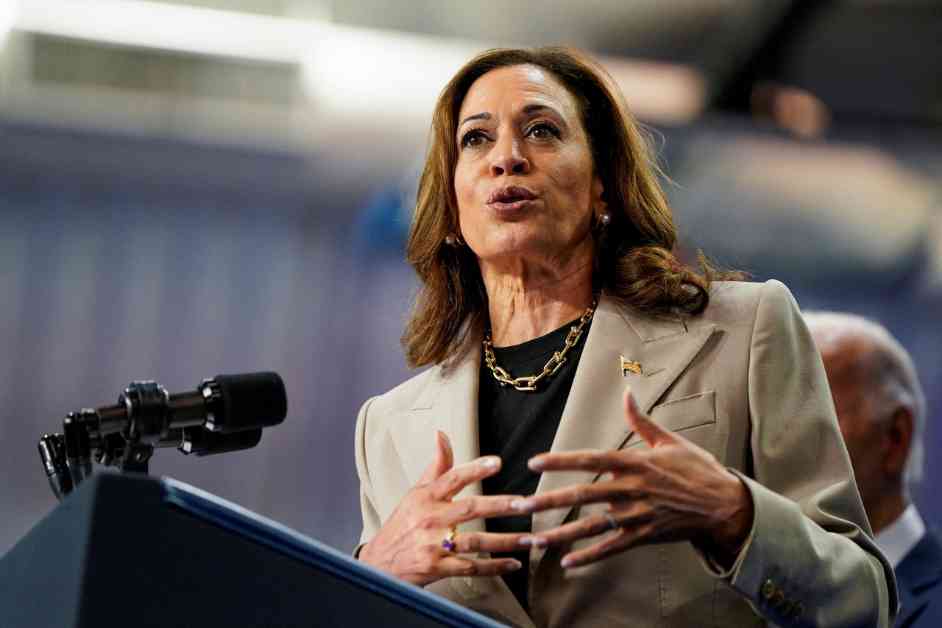**Beef Price Reduction Initiatives to Alleviate Financial Burden on Low-Income Households**
In a bid to tackle rising inflation and alleviate the financial burden on low-income households, Democratic presidential candidate Kamala Harris unveiled her economic policy initiatives during a campaign speech. With a focus on beef prices, Harris emphasized the need to combat inflation and reduce taxes to ease the financial strain on low-income families. She also stressed the importance of supporting the middle class, stating that a strong middle class is essential for a strong America.
Addressing the concerns of voters struggling with unaffordable housing, high prices, and soaring gas prices, Harris presented her vision of an “opportunity economy” in Raleigh, North Carolina, a swing state. She emphasized equal opportunities for all individuals to compete and succeed, stating that everyone, regardless of their background, should have the chance to create wealth for themselves and their children.
Harris quickly shifted the focus to the most pressing issue for many Americans – the rising cost of living. She pointed out that the price of a loaf of bread has increased by 50% since the onset of the COVID-19 pandemic and pledged to pass the first-ever federal order to prohibit price gouging on food items in the United States. Observers noted that Biden rarely discusses pre-pandemic and post-pandemic prices.
Drawing on her experience as a prosecutor unafraid to take on big corporations, Harris vowed to take action against those who do not “play by the rules.” She assured voters that as president, she would hold wrongdoers accountable for their actions. Additionally, Harris resonated with voters by sharing her middle-class background, highlighting her experience working at McDonald’s during college. She promised that if elected president, her top priority would be to reduce the cost of living and strengthen economic security for Americans.
Harris announced two tax relief measures tailored for the middle class, with over 100 million Americans set to benefit from tax cuts. The first measure is an income tax exemption for labor, and the second is a childcare tax exemption. The latter provides a $6,000 subsidy for families with newborns in the child’s first year, nearly double the amount in Biden’s first year in office.
While Trump’s running mate, JD Vance, proposed a universal $5,000 childcare tax exemption, Harris’s $6,000 subsidy is targeted towards low to middle-income households. She acknowledged the “severe housing shortage” in the United States and pledged to build 3 million affordable homes for the middle class by the end of her first term.
As president, Harris vowed to collaborate with the industry to construct the necessary housing, whether for rent or purchase. She promised to remove barriers, simplify regulations, and streamline processes at the state and local levels. Politico analyzed Harris’s economic strategy as an enhanced version of Biden’s economic plan. For instance, to cool down housing prices, Biden aimed to build 2 million homes, while Harris raised the bar to 3 million homes.
Harris also supported legislation to prevent investment companies from bulk purchasing rental properties to prevent corporate domination of the rental market and provide a $25,000 down payment subsidy for first-time homebuyers.
Choosing North Carolina as the venue for her campaign kickoff was a strategic move by Harris, as the Democratic Party has only won the state twice in the past half-century. According to a poll released on the 14th, Harris leads Trump in North Carolina by 48% to 47%, a narrow margin.
However, most of Harris’s policies require congressional approval, so even if she wins the election, the implementation of new policies will depend on whether the Democratic Party can retain control of the Senate and secure the House of Representatives.
With Trump leading the economic front, he is unlikely to sit back and watch Harris make significant strides. He delivered a lengthy speech in North Carolina, emphasizing the rising cost of living under Biden’s administration and claiming that only he can quickly address inflation.
The ongoing verbal sparring between the two candidates will culminate in a direct confrontation on the debate stage on September 10th.
**The Impact of Beef Price Reduction Initiatives**
The proposal to reduce beef prices comes at a crucial time when many low-income households are struggling to make ends meet due to the economic challenges posed by the COVID-19 pandemic. By addressing the issue of rising food costs, Harris aims to provide relief to those most affected by inflation and financial strains.
**Potential Benefits for Low-Income Households**
The reduction in beef prices could have a significant impact on low-income households, as food expenses often constitute a large portion of their budget. By lowering the cost of beef, Harris’s initiative could help alleviate financial burdens and improve access to nutritious food for families struggling to make ends meet.
**Challenges and Implementation**
While the proposal to reduce beef prices is a step in the right direction, there may be challenges in implementing such initiatives. Ensuring that the benefits reach those most in need and monitoring price controls effectively will be crucial for the success of the program.
In conclusion, the beef price reduction initiatives proposed by Kamala Harris have the potential to provide much-needed relief to low-income households facing financial difficulties. By addressing the issue of rising food costs and inflation, Harris’s economic policies aim to create a more equitable and prosperous future for all Americans.












